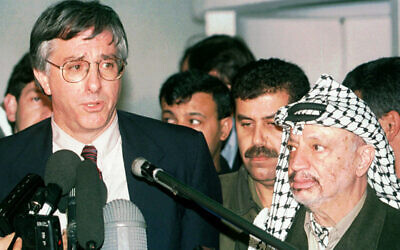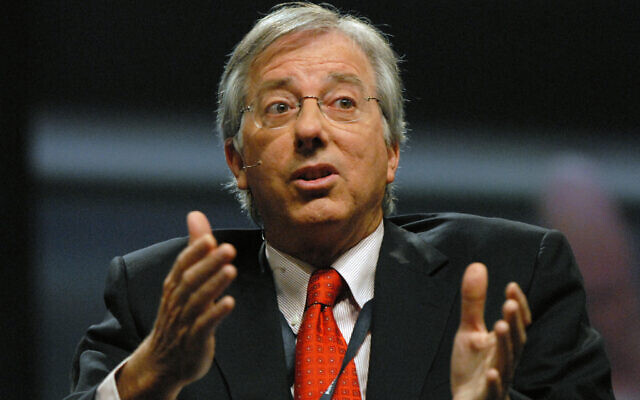INTERVIEW: Dennis Ross’ three-point plan to rid Gaza of Hamas
America’s most experienced Middle East diplomat gives his expert opinion on how the terror group's grip on Gaza can be negated to the extent that "they can’t make a comeback”.
Jenni Frazer is a freelance journalist
America’s most experienced Middle East diplomat, Ambassador Dennis Ross, says Israel has “an excruciating dilemma” in its war with Hamas.
But he told Jewish News that although he is firmly against a ceasefire, because he believes Hamas will only use the opportunity to regroup and rearm, nevertheless he thinks there are steps Israel can take to alleviate the humanitarian crisis in Gaza.
In a wide-ranging interview, the ambassador, who has served five American presidents in a variety of roles —presidents Carter, Reagan, Bush Sr, Clinton and Obama — said that “I would like to see Israel open up some of its crossings. Rafah [on the border between Gaza and Egypt] is the only crossing. If you need to get more aid in, Israel needs to open its crossings as well, at least one of them. Nothing can go through an Israeli crossing unless it’s been checked, and they have the most modern scanners, they can do it much more quickly”.
Rafah, he said, needed serious investment to modernise it — but that could not happen until after the war. “Right now, Israel has that capability”. Ross praised some of the “practical pauses” instigated by Israel, in order to allow civilians to move from north to south of the Strip, and said he was glad that Jordan had been allowed to airdrop supplies and that the UAE had set up a field hospital.
“I’d like the Israelis to have a field hospital as well — they have experience with this, they did it in Syria. I’d like Israel to create more of a public posture, saying, ‘look, we are fighting Hamas, we are not fighting the Palestinians of Gaza. But we are not the ones who are using Palestinians as human shields, Hamas is.
“We are doing everything we can to try to minimise the civilian casualties, to maximise the assistance that goes to them, and to make sure there are safe areas for them’. I’d like them to be articulating that”.

But while Israel is concentrating on how best to fight Hamas, there is the ongoing issue of the Israeli and foreign hostages being held in Gaza, which is where the role of the Qataris comes into focus. Ross said: “If you’re going to have a relationship with Hamas, you need to demonstrate what the value and benefit of that relationship is. There’s clearly a cost, in the sense that it helps give Hamas a platform, where they try to justify the indefensible”.
Qatar definitely had a role to play, Ross said. “It’s one that it’s not clear anyone else can play. But if they don’t deliver on it, then it’s fair to ask, why should you have this relationship with Hamas if you’re not able to affect their behaviour, and in a case like this, you’re not able to produce the release of the hostages? What is the point of the relationship if they [Hamas} benefit from it, but it’s not so clear how you [Qatar] and others benefit from it?”
The ambassador acknowledged anger on the part of those calling for a boycott of Qatari businesses and accusing them of having funded the October 7 attacks. But, he said, “This is not a simple balance to strike. Let’s remember that Israeli governments, under this prime minister [Netanyahu] from 2009 on, not only were working with the Qataris but also allowing them to provide money to Hamas. We can’t have it both ways. We can’t say they shouldn’t be providing money to Hamas when the Israeli government is facilitating the providing of money to Hamas.”
It had been a rationale of Netanyahu’s, Ross said, that “in effect it made more sense to have conflicts every few years which you could manage at a reasonable cost, than to have to go back in to Gaza. That policy turned out to be wrong.”

Today, he said, the American government was asking Qatar what the benefit was of its relationship with Hamas. The fact that in recent days both the CIA director, William Burns and the head of Mossad, David Barnea, had visited Qatar, indicated, said Ross, “that they see the Qataris as maybe the only channel that they feel is useful in terms of getting the hostages back”.
He also believed that post-conflict, when there should be necessary international investment into Gaza’s reconstruction, “that Qatar should be one of the major funders, under a leadership that is no longer Hamas”.
The ambassador warned that “Hamas is not going to be eliminated. First, it exists outside Gaza. What Israel is seeking to do is to destroy its military wherewithal, meaning its ability to fire and make rockets, mortars and bombs… its ability to be the strongest military power in Gaza.
“So one, it’s trying to destroy the Hamas military infrastructure. Two, Israel is trying to destroy its ability to maintain command and control, and that means being able to get at most of the leadership. Three, to undermine its organisational coherence. If you can do all three — that’s not eliminating Hamas. It won’t mean there will be no Hamas followers in Gaza. But if you do those three things, it means Hamas no longer has the ability to control Gaza”.
Even if those objectives were achieved, Ross said, “Israel can’t simply withdraw and leave a vacuum. There will need to be some sort of international umbrella for an interim administration.
“The idea that you can turn this over to the PA (Palestinian Authority) is an illusion. The PA now is much too weak, and itself needs to be revitalised and reformed. I do think Arab states will be ready to do more in Gaza and in terms of revitalising the PA, with a newly empowered Prime Minister, who is put in a position to clean things up. But they [Arab states] will want this tied to some sort of political horizon about how you resolve the conflict between Israel and the Palestinans”. That, he believed, would be something leading to a two-state solution.
Any post-war transition, said the ambassador, should be an interim administration “maybe with some kind of international mandate, which would involve a civil administration, security and reconstruction, and reconstruction based on being able to manage the materials that are coming in [to Gaza] and being able to monitor their end use. Then you end up with what amounts to reconstruction for demilitarisation”.
Israel can’t simply withdraw and leave a vacuum. There will need to be some sort of international umbrella for an interim administration.
Asked if he thought the war would be conducted differently if there were a different Israeli government, Ross demurred. “I don’t think that. October 7 was the darkest day in Israel’s history, the worst day in terms of killing Jews since the Holocaust, worse than any day during any war, the only war since Israel fought the War of Independence where parts of Israel were actually taken for a period of time — and the shock of that, the trauma, the colossal failure, from an intelligence, military and political standpoint — any government would be prosecuting this war.
“Look at the sheer brutality, the depravity of torturing before you kill, filming and celebrating the torture… it’s not just the anger in response to that. It’s the sense that this is a threat you have to remove, and the problem is that Hamas has embedded itself, deliberately, in densely populated areas, putting command posts under hospitals, weapons launchers in hospitals, mosques, schools”.
In previous conflicts with Hamas, Ross said, Israel set itself the object of hitting military targets. This time it was a matter of forcing Hamas to relinquish control in Gaza. And this time, “Israel needs not just to restore security, but a sense of security”.
No one could view what was taking place in Gaza and not be affected by it, Ross declared. “But who is mainly responsible for that? Hamas. It approaches its own population as if it’s OK to make all of them martyrs, because it serves their cause.”
As for the hostage crisis, he said, the Israeli government had to balance their return with its military objectives. “Israel will be called on to make some extremely tough decisions. Part of the problem is, what’s credible with Hamas? Will they deliver some of the hostages? At some point, yes. But the way they negotiate is to put out something, and then when it looks as though there is a response, they up the ante”. Ross believe it was necessary, in that case, for the Qataris to exert serious leverage on Hamas.
And what would signal the end of the war? The ambassador said that would come when it was clear that Hamas’s grip on Gaza had been negated to the extent “that they can’t make a comeback”.
He predicted a conflict “at least for the next few weeks”, although he was hopeful that Israel’s ground forces were making advances that could spell a swifter end to the campaign. “It appears that way,” he said.
• Dennis Ross is co-chair of the Jewish People Policy Institute

Thank you for helping to make Jewish News the leading source of news and opinion for the UK Jewish community. Today we're asking for your invaluable help to continue putting our community first in everything we do.
For as little as £5 a month you can help sustain the vital work we do in celebrating and standing up for Jewish life in Britain.
Jewish News holds our community together and keeps us connected. Like a synagogue, it’s where people turn to feel part of something bigger. It also proudly shows the rest of Britain the vibrancy and rich culture of modern Jewish life.
You can make a quick and easy one-off or monthly contribution of £5, £10, £20 or any other sum you’re comfortable with.
100% of your donation will help us continue celebrating our community, in all its dynamic diversity...
Engaging
Being a community platform means so much more than producing a newspaper and website. One of our proudest roles is media partnering with our invaluable charities to amplify the outstanding work they do to help us all.
Celebrating
There’s no shortage of oys in the world but Jewish News takes every opportunity to celebrate the joys too, through projects like Night of Heroes, 40 Under 40 and other compelling countdowns that make the community kvell with pride.
Pioneering
In the first collaboration between media outlets from different faiths, Jewish News worked with British Muslim TV and Church Times to produce a list of young activists leading the way on interfaith understanding.
Campaigning
Royal Mail issued a stamp honouring Holocaust hero Sir Nicholas Winton after a Jewish News campaign attracted more than 100,000 backers. Jewish Newsalso produces special editions of the paper highlighting pressing issues including mental health and Holocaust remembrance.
Easy access
In an age when news is readily accessible, Jewish News provides high-quality content free online and offline, removing any financial barriers to connecting people.
Voice of our community to wider society
The Jewish News team regularly appears on TV, radio and on the pages of the national press to comment on stories about the Jewish community. Easy access to the paper on the streets of London also means Jewish News provides an invaluable window into the community for the country at large.
We hope you agree all this is worth preserving.






















